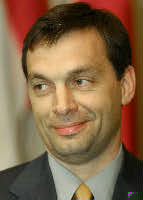Little-known European state to trouble quiet 'Old Europe'
Every fourth ethnic Hungarian lived outside Hungary by the beginning of the 21st century
It has become some sort of a fashion to review results of WWII. Latvia and Estonia allow open Nazi parades; Germany and Austria demand that Germans resettled from the territories of victor countries must be compensated for the damage. A revenge-seeker has been the most popular politician of Hungary for several years already. 

It is the former Prime-Minister of Hungary Viktor Orban, 42, the leader of FIDESZ, the party which ideology combines economic liberalism and social justice. Orban's populism lies in his open demands to grant Hungarian citizenship to people of neighboring countries and he also prejudices the present-day boundaries in Europe.
The modern history of Hungary reveals why the idea is so much popular. After WWI, the country lost many territories inhabited by ethnic Hungarians. Over 4 million Hungarians found themselves in Romania, Czechoslovakia and Yugoslavia. In 1940, the country became an ally to the Nazi Germany and retrieved majority of territories lost in 1918. But in 1945, Hungary once again lost all of its territorial acquisitions. It was planned that millions of people must be resettled from Slovakia, Romania, Serbia and Transcarpathia that became part of Ukraine to Hungary. At that time, the USSR stopped the process to support its new socialist ally.
As a result, by the beginning of the 21st century, every fourth ethnic Hungarian lived outside Hungary with its 11-million strong population. All of these people would not like to remain national minorities in those countries where they live.
When Orban came to power, he passed several laws to improve contacts of Hungarians living in neighboring countries with their ethnic homeland. Now, Hungarian higher education institutions have quotas for accepting students from neighbor countries; the national budget finances Hungarian schools located in neighboring countries. At the same time, Hungary began to organize parades of Hungarian army veterans, allies to the Nazi German army. When the law on a simpler procedure of granting Hungarian citizenship was passed, citizens of Slovakia and Romania brought an action against Hungary at the European Court which in its turn demanded to suspend implementation of the law.
Orban began to seek allies in other countries. Together with Germany's CDU/CSU and People's Party of Austria, Hungary demanded that Czechia, Slovakia, Poland and Slovenia must abolish the decree on eviction of Hungarians and Germans. The politician believed that the European Union would give him a chance to change the order that had formed after WWII; he said he wanted “to liquidate the injustice toward Hungarians.” These initiatives made Orban incredibly popular in Hungary.
Viktor Orban was speedily gaining popularity among the electorate and FIDESZ became a leading party. In April 2002, Orban lost his prime-minister position. At the election, he won 49 percent of votes. No other party would like to make a block with Orban, that is why his party won scanty parliamentary minority and Orban became the opposition leader.
But being in shadow, the former prime-minister was still gaining popularity. He organized a referendum on granting Hungarian citizenship to all Hungarians living abroad. The referendum failed because of the low appearance of the electorate and the European Commission that threatened to apply sanctions to the country because of the referendum. But the European Parliament approved of another FIDESZ' idea: together with colleagues from Finland and Estonia, the Hungarian opposition condemned Russia for “oppression of Finno-Ugric people.”
Today, almost all opinion polls predict that FIDESZ may be a sure winner at the 2006 parliamentary election. Besides, Viktor Orban is an informal leader of Hungarian minority parties in Romania and Slovakia and the most popular politician among Hungarians living there. Taking into account that Orban's German and Austrian allies are currently in power, it is not ruled out that the politician may become a key disturber in Eastern Europe.
Vadim Trukhachev
Subscribe to Pravda.Ru Telegram channel, Facebook, RSS!


